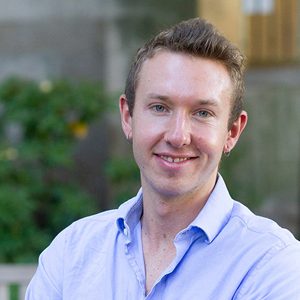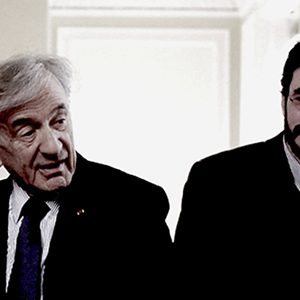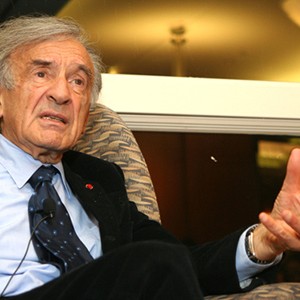Nearly 20 years after Jonathan and Pam Taub met in Elie Wiesel’s class Exile and Imagination, they remain grateful for more than the profound lessons they learned from the Nobel Peace Prize laureate. Taub, at the time a Harvard Law School student doing an independent study at BU, and Pam (CAS’98, MED’03), then a junior in the College of Arts & Sciences, came away with a cherished friend and mentor in Wiesel (Hon.’74), BU’s Andrew W. Mellon Professor in the Humanities.

The Taubs with their son Adam and Elie Wiesel, in April 2013.
“Once you’re a student of Elie Wiesel, you’re always a student of Elie Wiesel,” says Jonathan, who remembers the comfort his former professor offered when his mother died unexpectedly about a decade ago. “I just couldn’t pull out of grieving, even after a year,” he says. At Pam’s suggestion, he wrote a letter to Wiesel. “I said, ‘I know you’re busy. My mother passed away. I need help.’ He called—it must have been the same day he received the letter—and the things he said really brought me out of the abyss.”
Wiesel’s class was a dream come true for Pam, who grew up in central Florida and relied on books to experience the world. “When I was 13, I read Night and it really moved me,” she says. “Years later, when I came to BU, one of the first things I did was find the author of that book and interview for his class.”
“Professor Wiesel loves his students, and we love him,” says Jonathan. “He did not miss a single day of that class—not one. He could be overseas advising heads of state, but he would always make a point of being back in Boston with us every week.”
One of the lessons the couple learned from Wiesel, an author and a Holocaust survivor: do as much as you can, in your own meaningful way, for others. The Taubs took the message to heart. In September, they donated a bronze bust of Wiesel to BU; the sculpture has been installed in the Elie Wiesel Center for Judaic Studies.
“It’s a small token of our appreciation and love for the city of Boston, the University, and, most important, for Professor Wiesel,” says Jonathan, who is executive vice president of Acacia Research Group. “He has dedicated his whole life to helping and counseling others—myself included—and what more wonderful way is there to honor him than by giving this gift to Boston University, a place that has a special place in his heart, and in ours.”

Sculptor Marc Mellon (second from left) and his wife, Babette Bloch, with Pam and Jonathan Taub. The inscription on the bust reads, “Elie Wiesel/Our beloved teacher and friend./‘Messenger to Mankind’/May we all be your students, now and forever.” Photo by Tara Jones Photography
The couple says they’re grateful to Wiesel for something else: bringing them together in that class, in 1996. Jonathan remembers the day he hid a rose under the table until after class, when he would to give the bloom to Pam and tell her how he felt about her.
“Things didn’t quite go according to plan,” he recalls. Wiesel’s class ran long, and Pam had an appointment immediately after, barely leaving him time to present the rose. The scheme didn’t surprise Wiesel. From the first day of class, he’d noticed Jonathan’s frequent glances at Pam. Jonathan and Pam, a cardiologist and an assistant professor of medicine at the University of California, San Diego, were married in 2003 and live in southern California with their two children.
Nearly a decade later, a bust of Wiesel, created by the Taubs’ friend, the New York sculptor Marc Mellon, was unveiled at the 92nd Street Y in New York. Mellon recalls that the project was deeply moving. “I keep a list in my brain of dream projects,” he says. “This was one of them. Years ago I said to my wife, ‘Wouldn’t it be wonderful someday to be involved in recognizing Elie Wiesel?’ That was 15 or 20 years ago.” Like the Taubs, Mellon believes the sculpture is a permanent recognition of Wiesel’s lifetime of significant work.
The couple was inspired to donate a second casting of the bust to BU, to show how much the University and Wiesel mean to them.
“It’s our hope,” says Pam Taub, “that future generations of students will look at the bust and say, ‘Who is this person?’ and be inspired to learn about Professor Wiesel and his teachings.”



















































I was in Professor Wiesel’s Literature of Memory: Jewish Women’s Voices class in 1996. I loved every minute of it. We read a book a week, and I often wondered how Professor Wiesel found the time to keep up, since he told us he never teaches the same class twice. In spite of his busy travel schedule, he was almost always present and never late. He was fully prepared with deep appreciation and inspiring insights of every book we studied. Best of all, he encouraged discussion about his comments and showed genuine respect for everyone present. I admire Professor Wiesel and try to model my teaching at Roger Williams University after the kind, thoughtful way he taught me long ago. He is a wonderful person and sensitive man. I often think how fortunate I was to be his student.
I also read “Night” and was deeply impressed. I am also a
Holocaust survivor, and wrote a book about my story, which was published by AMAZON . “Got Showed us the Way”